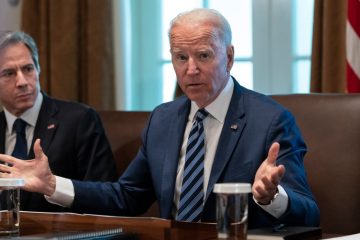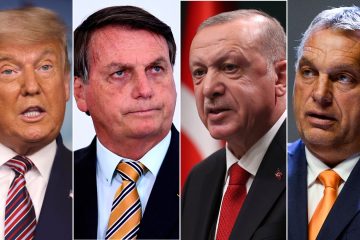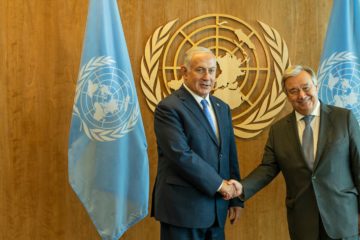
After Gaza: Prospects for a political solution to the conflict
Despite the appalling course of events since 7 October, the continuing fighting and the suffering of the bereaved and displaced in Israel and Gaza, people are beginning to ask where this will all end, how it will end, and even whether it will end? It is essential to address these questions now, because a lasting solution can only be found once people on both sides have some hope for the future The emergence of the two-state solution Since the 1917 Balfour Declaration declared support for a Jewish homeland in Palestine and fuelled the two growing national movements of Jews and the Palestinian Arabs, there have been only three possible solutions to the question of who lives in the land between …

Have we underestimated migration in the Franco-Moroccan diplomatic crisis?
Traditionally close partners, Morocco and France have seen their relationship deteriorate in recent years under a variety of pressures. Much analysis has focused on the role of high politics and diplomatic considerations, such as the question of the sovereignty of Western Sahara. This article argues that while these are important, bottom-up approaches must also be considered. In particular, we highlight the impact of visa restrictions on inter-societal links, and how these affect the core of bilateral relations by damaging the human fabric of politics. The “exceptional partnership” between France and Morocco is a thing of the past, or at least severely damaged. Over the last two years, new crises have erupted at regular intervals. The most recent source of tension …

Variable Geometry: What Washington is Getting Wrong
The new buzzword echoing through the halls of the White House is variable geometry. Faced with a panoply of transnational threats, the Biden administration is building fit-for-purpose coalitions between countries and other stakeholders, including local governments, the private sector, NGOs, and academia. Coalitions have been formed to address discrete policy challenges, including COVID-19, food security, providing aid to displaced Ukrainians, and most recently, synthetic opioids. In times of polycrisis, variable geometry suggests that the “America First” policy is no longer viable. Yet, the diplomatic currency of the United States remains zero-sum; official statements about defending the liberal world order continue to echo the end of history thesis, without accounting for the growing demands of middle powers – particularly those in …

Identity Capital and the North-South Gap in Explaining Populism
The literature on populism in the 21st century often assumes that far-right leaders draw their support from voters who have lost out to globalisation. This is the case among low-skilled, white workers in Global North democracies, including the United States. But, there are also meaningful occurrences of backlash against the political establishment and liberal values in parts of the Global South that have clearly benefited from the post-Cold War trade openness. For instance, two of the largest democracies in the developing world have been shaken by right-wing movements that came to power with the support of the winners of economic liberalisation. In Brazil, Jair Bolsonaro, a former army captain, won the presidency in 2018 with the support of agribusiness exporters …

Pacifism as pragmatism: Brazil’s stance on the war in Ukraine
Since the beginning of Russia’s war on Ukraine, Brazil, then still under Bolsonaro’s government, has maintained an official position of neutrality. Under Lula’s administration, this position did not change, frustrating many policymakers in the Global North. So what explains Brazil’s stance on the war in Ukraine? Dawisson Belém Lopes argues that Brazil’s position must be understood against the backdrop of its constitutionally enshrined pragmatic pacifism and diplomatic tradition. Brazil’s diplomatic history and foreign policy tenets Brazil has not always been a pacifist nation in international affairs. At the beginning of the 19th century, when the country gained independence from Portugal, the Brazilian elite was deeply concerned about maintaining the country’s territorial integrity. During this period, interstate wars were fought, particularly …

‘Uniting for Peace’ Against Israel’s Annexation Plan
With the diversion of Israel’s military resources towards West Bank, Israeli annexation of occupied Palestinian territory appears imminent, pending approval from and coordination with the American administration. Struggling to rally right-wing voters amidst the fight for his political survival in the elections of April, September 2019 and March 2020, Prime Minister Benjamin Netanyahu had stated that he would “apply Israeli sovereignty” over the West Bank, if re-elected. Bolstered by the reversal of decades of American policy on the issue and the subsequent release of Trump’s much criticized, one-sided ‘Middle East Peace Plan’ in January 2020, Netanyahu has aggressively pursued the annexation agenda with the emergency government formed with Benny Gantz in March 2020. Considering the expected blockage of the Security …
Have We Finally Moved Past the Unilateral Age of Apollo? The Artemis Accords, Explained
The United States, under the Trump administration, has aimed to excite interest in space activities, including through the highly publicised creation of the Space Force and the manned space flight missions with SpaceX. Importantly, the announcement of the Artemis Accords in mid-May is an extension of such an effort. The Accords are envisioned as a set of bilateral agreements with the intent to return astronauts to the moon and beyond. Led by the United States and a series of commercial and international partners, they mark a seminal development in the outer space governance regime. As the United States and its international partners venture to create and strengthen outer space governance, non-space faring nations must be included in future agreements to ensure they are not systematically excluded from accessing lunar resources and development opportunities. The Artemis Accords program is spearheaded by the National Aeronautics …
Britain-China relations: Is Coronavirus a turning point?
The past five years have been deemed a “Golden Era” in Britain-China relations, with the two countries promoting bilateral trade and investments. However, as the Coronavirus pandemic marches on, this relationship seems to be souring. Voices in Britain, especially in Conservative environments, have raised need to rethink or reset the nation’s relationship with China, who is accused of misinforming and mismanaging the pandemic. While Coronavirus is exacerbating tensions, it would though be incorrect to blame it fully for the chill in relations. A distancing from China was already occurring prior to the pandemic. The foundations of the “Golden Era” were established during the Conservatives’ return to government in 2010. Chinese investments in the United Kingdom were seen as a key source …









